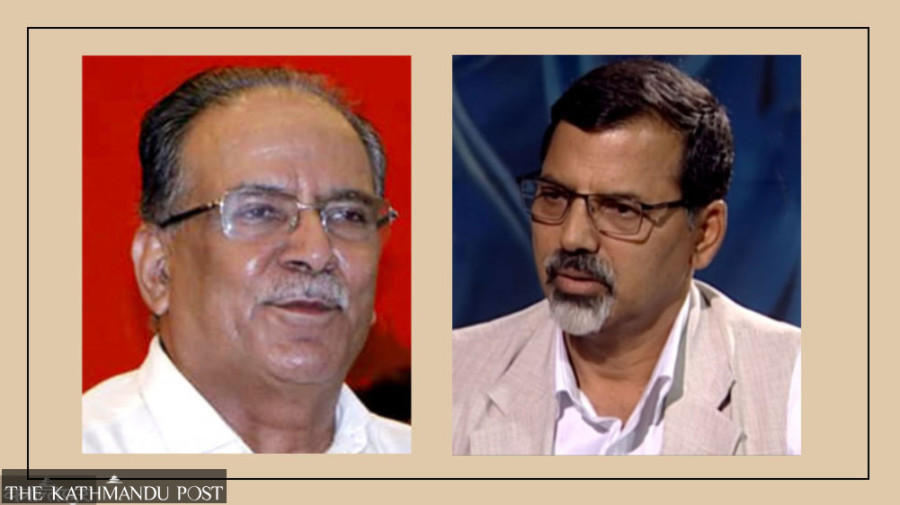Politics
Is leftist alliance in the works amid deepening division in the Maoist Centre?
The second-generation leaders of communist parties are currently gauging their prospects of working together.
Purushottam Poudel
Tensions between Chairperson Pushpa Kamal Dahal and Deputy General Secretary Janardan Sharma have resurfaced in the CPN (Maoist Centre). Dahal and Sharma, who had taken opposing sides during the party’s Standing Committee meeting held in August last year, are again at odds.
The recent discord became apparent after the two leaders publicly criticised each other from different platforms.
On July 23, during a programme commemorating Pushpalal Memorial Day, Sharma remarked that—except for Manmohan Adhikari—none of Nepal’s communist prime ministers had been able to stay away from middlemen and commissions. Maoist Centre chair Dahal has held the office of prime minister for three times till date.
Sharma’s veiled criticism of the party leadership sparked strong reaction from several Maoist Centre leaders, including Lekhnath Neupane, Madhav Sapkota, and Dahal’s former secretariat chief Ramesh Malla, all of whom fired back at Sharma. Dahal himself is not aloof on this.
At a time when dissent within the party is intensifying, Sharma has recently been holding meetings with Ghanshyam Bhusal, General Secretary of CPN (Unified Socialist), and Netra Bikram Chand, General Secretary of the Communist Party of Nepal (CPN).
On July 22 in Kathmandu, Sharma, Bhusal and Chand jointly organised a programme where they criticised the leadership of leftist parties.
While such meetings between the three leaders had taken place in the past as well, recent discussions have centred on the discussion that the communist movement, in its current state, cannot move forward and that a transformation is necessary.
Sudan Kirati, a Maoist Centre leader close to Sharma, said that the three communist leaders’ regular meetings are aimed at building a loose alliance of like-minded communist parties.
“To correct the current functioning of the communist parties, the leaders are considering working for their transformation,” Kirati told the Post.
However, he did not mention whether the loose alliance would entail formation of a separate party or if these leaders will be working from within their current parties.
But another leader of Maoist Centre from Sudurpaschim Province, also close to Sharma, said Sharma’s recent activities could be discussed at the party’s Standing Committee meeting, which commences on August 1.
“As far as I know, Sharma is not trying to form any party or loose alliance outside the party. His engagements are only aimed at the Maoist party’s transformation,” the leader said.
Unified Socialist leaders close to Bhusal concur. The second-generation leaders of communist parties are currently gauging their prospects of working together.
This does not mean that they are considering forming a new communist front or any loose alliance, the leaders argued.
In the same context, Chand also met CPN-UML General Secretary Shankar Pokharel on July 27.
At a time when the Socialist Front—an alliance of the Maoist Centre, Unified Socialist Party, Chand's party, and the Nepal Federal Socialist Party—has struggled to stay active, the meeting between Pokharel and Chand is seen as significant. However, leaders close to Chand say discussion focused solely on urging Pokharel to join the campaign for the transformation of the communist movement.
Formed under Dahal’s leadership on July 8, 2023, the Socialist Front remained largely inactive for a long time. Even after the Dahal-led government was replaced by a coalition led by the Nepali Congress and CPN-UML on July 14 2024, the front resumed meetings from July 17. Yet it has failed to work as envisioned.
Amid this, Chand’s engagements with Maoist Centre Deputy General Secretary Janardan Sharma and Unified Socialist General Secretary Ghanshyam Bhusal have intensified. Chand also reportedly conveyed to Dahal and Madhav Kumar Nepal, chair of Unified Socialist, that the front was no longer functioning and proposed its dissolution.
After the suggestion, the front had met again on Tuesday.
Following that, Chand has repeatedly hinted at the possibility of a new polarisation within the communist parties.
But Ram Karki, a secretary of the Maoist Centre, said it is true that restlessness has taken hold of all the parties, including the communist ones. “Autocracy is gradually dominating the leadership whereas the essence of communism is being lost even in communist parties,” Karki said.
He added that in such a context, the three leaders standing together can mark the beginning of something new.
“As previous divisions in communist parties have not been beneficial, the trio should not consider that path even if they are thinking of building an alliance,” Karki said.
Meanwhile, Sharma on Tuesday has put forward four key proposals calling for a special general convention of the party. Taking to Facebook, Sharma has claimed that rumours of an imminent party split have been deliberately propagated by the party’s top leadership. He has also urged party members not to fall prey to such narratives.
“A special general convention will pave the way for restructuring the party,” Sharma writes. “The convention will formulate a new action plan to address ideological vagueness, political uncertainty, organisational anarchy, and procedural lapses that also aligns with the aspirations and dreams of the younger generation.”




 13.12°C Kathmandu
13.12°C Kathmandu















